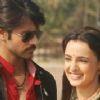In all honesty, there are some discrepancies and larger than life portrayals of the characters in that era. For instance,
(i) You pointed out the mindset of the girls and the discussions, true, while girls did have feelings and thoughts pertaining to the issues, they were not so open and vocal about it. Since they have based this series on Amrita Pritam and the key protagonists of her stories, they have made them think ahead of times and put into dialogues the forbidden/taboo discussions too.
(ii) Religious harmony was prevalent but dining with the other religion/gender was restricted. Religion and relations were not mixed. The education bit too: There used to be a certain aversion to educate children in English missionary schools, so parents used to put them in the religious institutions to learn their culture and values. Literacy rate for women was 2.8% pre-Partition in the region. In contrast, Vashma and Amrit and their families seem to be well-integrated to the point where they sit, eat and study together. This is to give a sense of just how much will change with the Partition.
(iii) Quick transition in their stories: Agreed; they met and seem to have fallen in love too soon. But since the key lesson here is of the Partition, they are seeking to build a narrative of 5 years in 5 months and show us just how drastically things might change and the impact the trauma will have on these hearts, who will be brutally seperated in the horrific event.
But since they are catering to people in the 21st century, they have tried to show how they all have dreams, hopes, feelings just like us, which will soon be torn apart. They want us to connect to the characters and even live with them in some sense so when the humanity dies, we can feel their pain and suffering too.























comment:
p_commentcount